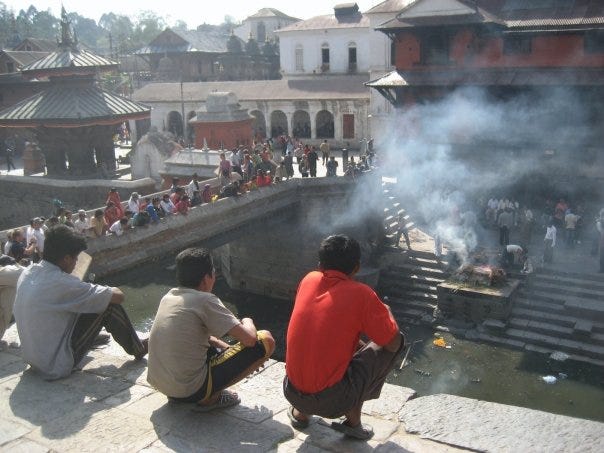Smoke billowed at the head of the river. A Hindu funeral pyre burned. I didn’t see their faces or hear the conversations of those in attendance; but I did see the ashes in the water, flowing downstream towards me.
They floated on down, the gray wet clumps. The remnants of what used to be a life.
I was told that what I was seeing were the remains of those who have been purified by fire. Fire setting free the souls—the atman—of the recently deceased to begin the journey on to the next life and the next reincarnation.
It’s all beautiful and poetic, but at the time, I was an evangelical Christian. There to preach my beliefs and save souls in the temple. I had just arrived in Kathmandu, Nepal, as a part of a missionary team. We spent three months in country: a month in Kathmandu in 2008 while a Maoist insurgency toppled the king; a month in the Himalayas hiking from hamlet to hut; a month everywhere else in-between.
On this day I found myself in the heart of a Hindu place of worship, passing out pamphlets written in Nepali about Jesus. The Nepali greeting for “hello” is Namaste—one meaning could be “I greet the god in you.” Our local guide, a radical Jesus-guy named Robby Rai, didn’t like the pagan connotation and insisted we say “Jaimashi” instead—”Victory to Jesus.”
We said it. No one understood us. But they smiled anyway.
In fact most people smiled and accepted the leaflets I passed out and moved on with their days.
Some said, “Sure, I’ll love this Jesus guy. Put his picture right next to Ganesh and the two can be buddies.”
No one actually said that to me, but you get the drift.
Most people were all smiles. Most people invited us into their homes for chai.
Everyone except for Tiger Baba.
His eyes were as red as the flames that lapped at the pyres. His hair hadn’t been washed in months, dreadlocks that reached to his knees. His body odor was thick and you could actually taste it as you got close. He slept along the river banks, practicing meditation, waiting for the coming of spiritual power.
Power in the form of ashes.
Of the dead.
Tiger Baba was a cannibal.
He believed that by consuming the ashes—and sometimes more intact body parts that don’t burn fully—he would receive power.
He never said what power he would receive exactly or why, but he did speak with conviction.
A firmness that shook me.
Tiger Baba did not want to hear about Jesus. His hands rattled when I spoke and I was half-afraid he’d strike me if I didn’t shut up.
He wanted me to see his power. To wait with him and watch him partake of the communion of the dead. His crimson eyes were wide and lanced my own.
“No, that’s okay. God bless.” I said and walked away.
It was a short interaction. But one that has stayed with me for 17 years now.
Tiger Baba.
At first I thought him insane or even demon-possessed. I mean come on, a guy who eats people!
Why does this brief story stick out to me?
Because the same conviction that led a man to eat the dead also led me to try and change a nation’s beliefs.
Sure, we went about our faith in different ways. But Tiger Baba was a man convinced he was fulfilling his purpose. And so was I.
Which of us was right? Which one wrong?
I still don’t know. Is that even the right question?
It’s easy to say Tiger Baba was a sick man. And maybe he was. But he did what he did based off his faith. His firm conviction that he was attaining enlightenment. How many people in church pews singing hymns robotically can say they would do what Tiger Baba did if God told them to?
There is no answer here. I have none.
But on the day I write this, thinking about the power of belief and what it can drive us to—both good and bad—I am always reminded of Tiger Baba sitting on the riverbanks. And me passing out pamphlets, uttering gibberish greetings to the people.





It's quite an image. You painted it well.
You are such an awesome writer ! I felt like I was there and had seen what you described . Great story . Great thoughts ! Wishing you well sweet friend . Tammy